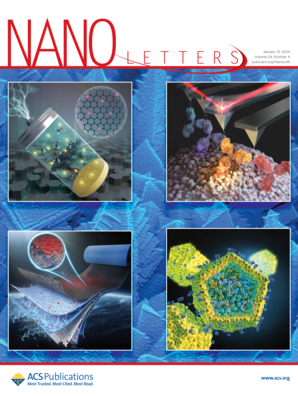Phase Transformation Induced Basal Plane Capacitance Enhancement in Two-Dimensional Materials for Electro-Driven Ion Capture
IF 9.6
1区 材料科学
Q1 CHEMISTRY, MULTIDISCIPLINARY
引用次数: 0
Abstract
The capacitive deionization (CDI) technique using two-dimensional (2D) layered Faradaic electrodes offers a promising approach to desalination, but the desalination efficiency of currently engineered electrodes remains insufficient due to unclear charge storage mechanisms. Herein, based on typical 2H and 1T phases of MoS2, we systematically investigated the underlying structure–capacitance relationship of 2D materials at the atomic level by revealing differences in interlayer ion storage confined by molecular layers. Our study reveals that octahedrally coordinated 1T phase with a high spin state of unpaired electrons exhibits a higher pseudocapacitive ratio compared to the 2H phase because of the enhanced interfacial charge transfer polarization, reduced surface ion migration barriers, and increased interlayer ion enrichment. Furthermore, the potential molecular layer structure evolution triggers the dynamic migration of ion intercalation sites, further constraining the ion storage performance of the 2H phase. This study offers guidance for optimizing the ion storage performance of 2D materials through phase engineering.

使用二维(2D)层状法拉第电极的电容式去离子(CDI)技术为海水淡化提供了一种前景广阔的方法,但由于电荷存储机制不明确,目前设计的电极的海水淡化效率仍然不足。在此,我们以 MoS2 的典型 2H 相和 1T 相为基础,通过揭示分子层限制的层间离子存储差异,系统地研究了二维材料在原子水平上的基本结构-电容关系。我们的研究发现,由于界面电荷转移极化增强、表面离子迁移障碍降低以及层间离子富集增加,与 2H 相相比,具有高自旋态非配对电子的八面体配位 1T 相表现出更高的伪电容比。此外,潜在的分子层结构演变会引发离子插层位点的动态迁移,从而进一步限制了 2H 相的离子存储性能。这项研究为通过相工程优化二维材料的离子存储性能提供了指导。
本文章由计算机程序翻译,如有差异,请以英文原文为准。
求助全文
约1分钟内获得全文
求助全文
来源期刊

Nano Letters
工程技术-材料科学:综合
CiteScore
16.80
自引率
2.80%
发文量
1182
审稿时长
1.4 months
期刊介绍:
Nano Letters serves as a dynamic platform for promptly disseminating original results in fundamental, applied, and emerging research across all facets of nanoscience and nanotechnology. A pivotal criterion for inclusion within Nano Letters is the convergence of at least two different areas or disciplines, ensuring a rich interdisciplinary scope. The journal is dedicated to fostering exploration in diverse areas, including:
- Experimental and theoretical findings on physical, chemical, and biological phenomena at the nanoscale
- Synthesis, characterization, and processing of organic, inorganic, polymer, and hybrid nanomaterials through physical, chemical, and biological methodologies
- Modeling and simulation of synthetic, assembly, and interaction processes
- Realization of integrated nanostructures and nano-engineered devices exhibiting advanced performance
- Applications of nanoscale materials in living and environmental systems
Nano Letters is committed to advancing and showcasing groundbreaking research that intersects various domains, fostering innovation and collaboration in the ever-evolving field of nanoscience and nanotechnology.
 求助内容:
求助内容: 应助结果提醒方式:
应助结果提醒方式:


